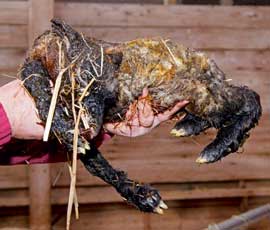Schmallenberg vaccine ‘too late for breeding season’

The Schmallenberg virus could spread to Scotland and Wales this year but it is “unlikely” that a vaccine will be available to fight it ahead of the sheep breeding season, scientists have warned.
Scientists believe the disease, which causes deformities in newborn sheep, cattle and goats, has survived the winter and is circulating again in livestock for a second season.
They fear Schmallenberg, which was spread by biting midges and affected counties mainly in south and east England last year, could spread further north and west this year – even as far as Wales and Scotland.
“The virus spread very effectively last year and I see no reason why is couldn’t spread to cover most of the country this year,” said Peter Mertens, head of vector-borne diseases at the Institute for Animal Health.
Last week, the National Sheep Association and the Sheep Veterinary Society issued a joint statement saying a vaccine was “desperately needed to prevent a catastrophe”.
“It’s early days, but we are seeing a resurgence of the disease.”
Nigel Gibbens, UK chief vet
One pharmaceutical company has developed a vaccine that has been shown to be safe, said Prof Mertens. But the introduction of a vaccine for Schmallenberg in time for the breeding season was “unlikely”.
“We are aware that there are pharmaceutical companies looking at vaccination,” Prof Mertens told a news briefing in London on Tuesday (7 August).
“One company has announced it would like to go through with the licensing process this year. They have tried the testing and it showed that the vaccine is safe.
“But where we are now, it seems unlikely that there will be a vaccine available for this year’s breeding season.”
This is because the licensing procedure could take many months, added Prof Mertens, who stressed it was important that only safe products were introduced.
In most cases, the impact of Schmallenberg is low, said Prof Mertens. However, one farm he had seen had 30% of young animals being born with deformities and the effects were “devastating”.
Tests carried out in March on 150 cattle and more than 1,000 sheep belonging to the Royal Veterinary College confirmed a small number of cases. Overall, approximately 3% of the animals had been infected.
The same animals were tested again in June to see if there were any signs of new infection. Although the positive animals still tested positive, a small number of additional animals – one cow and two sheep – tested positive.
Two of the RVC’s herd of 10 alpacas also tested positive for the disease.
“It’s early days, but we are seeing a resurgence of the disease,” said Nigel Gibbens, UK chief veterinary officer.
A new survey of affected holdings has just been completed and the results would be released soon. “Early indications suggest that between 2-5% of flocks/herds could be infected,” said Mr Gibbens.
In the meantime, and in the absence of a vaccine, Mr Gibbens urged farmers to work closely with their vets and consider other control measures.
“Farmers could change the time of mating of your herd to ensure it is later than the likely infected period,” he suggested.
Testing animals for the virus was expensive and results could be inconsistent because the virus is only present in adult animals for a short time, said Mr Gibbens.
So far, there have been 276 confirmed cases of Schmallenberg in cattle and sheep across farms in the UK.
See our page on the Schmallenberg virus
